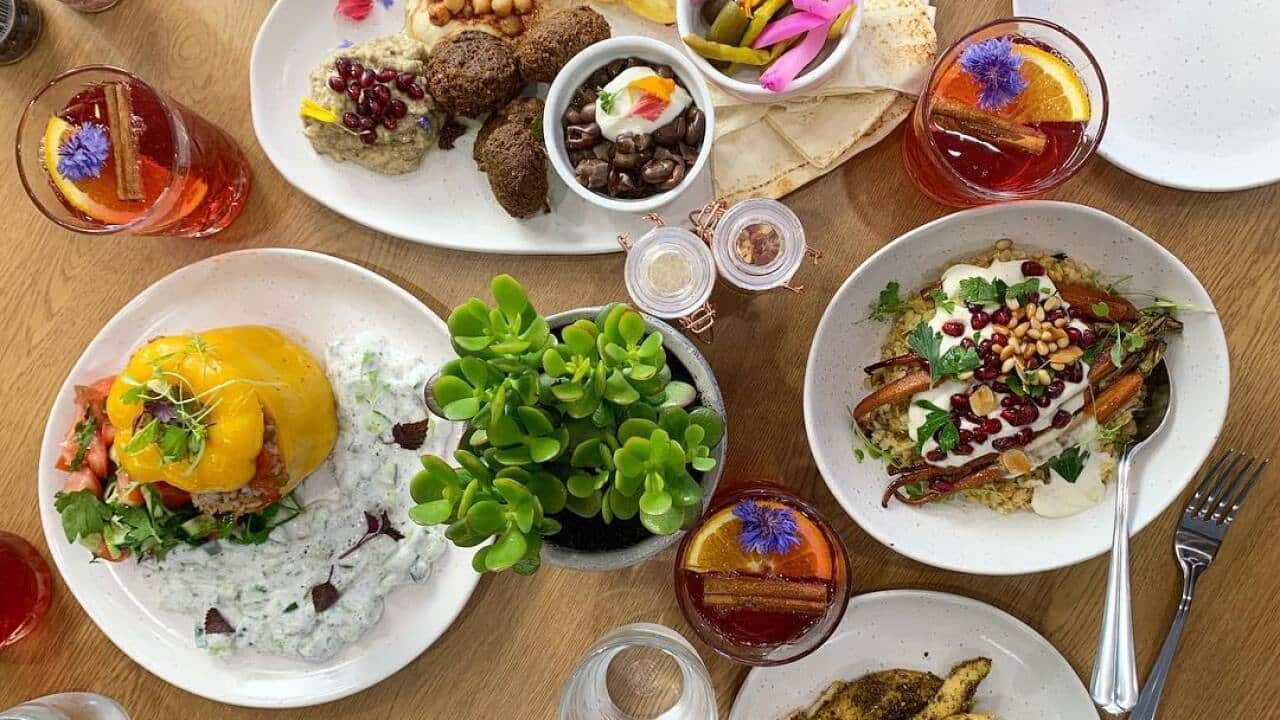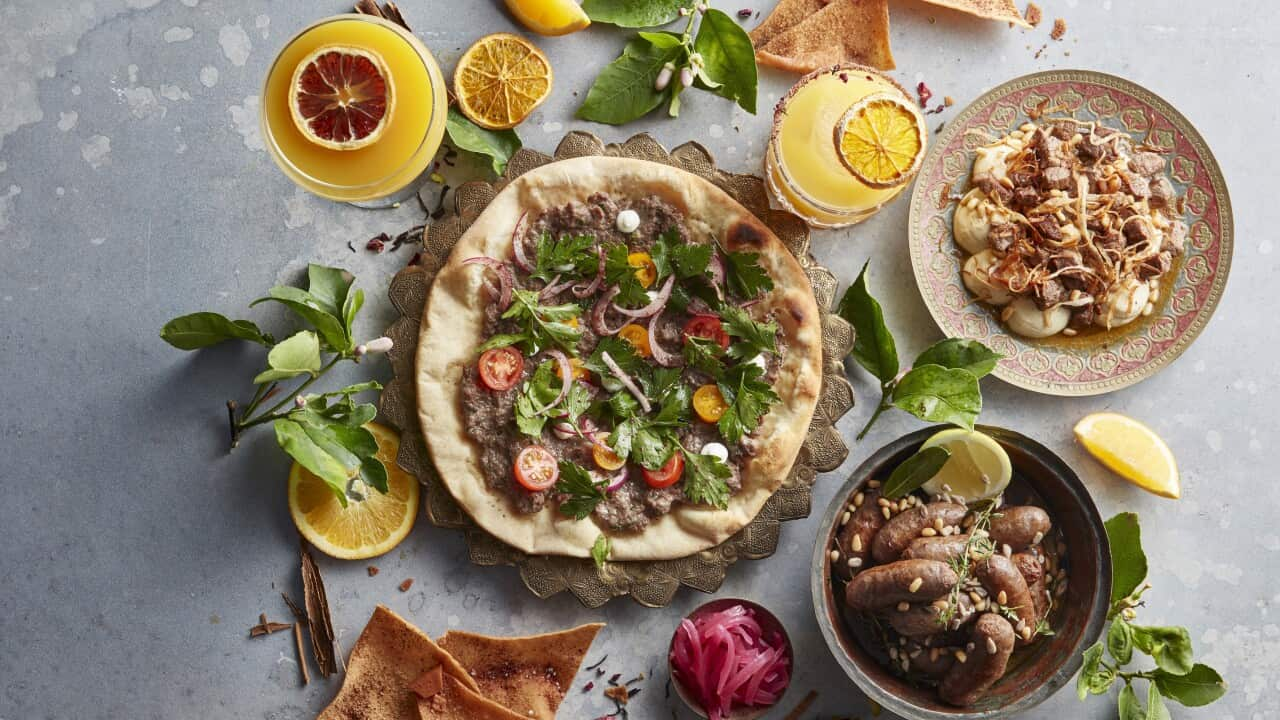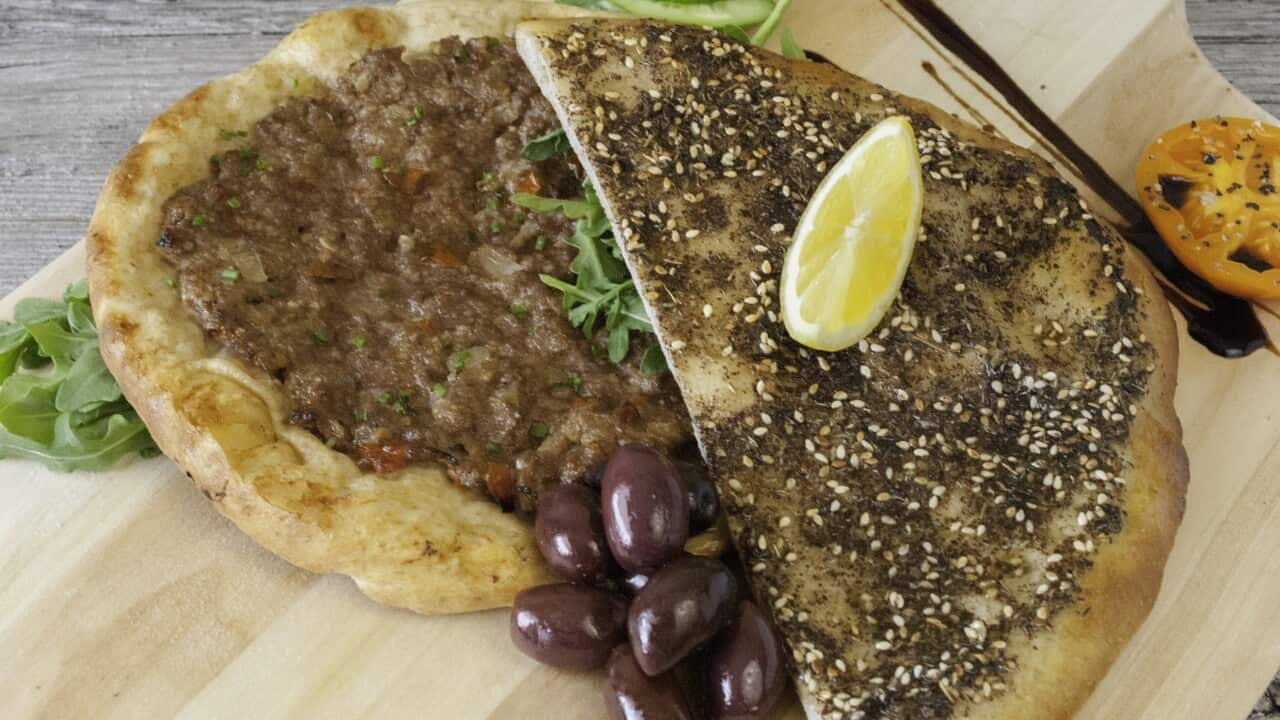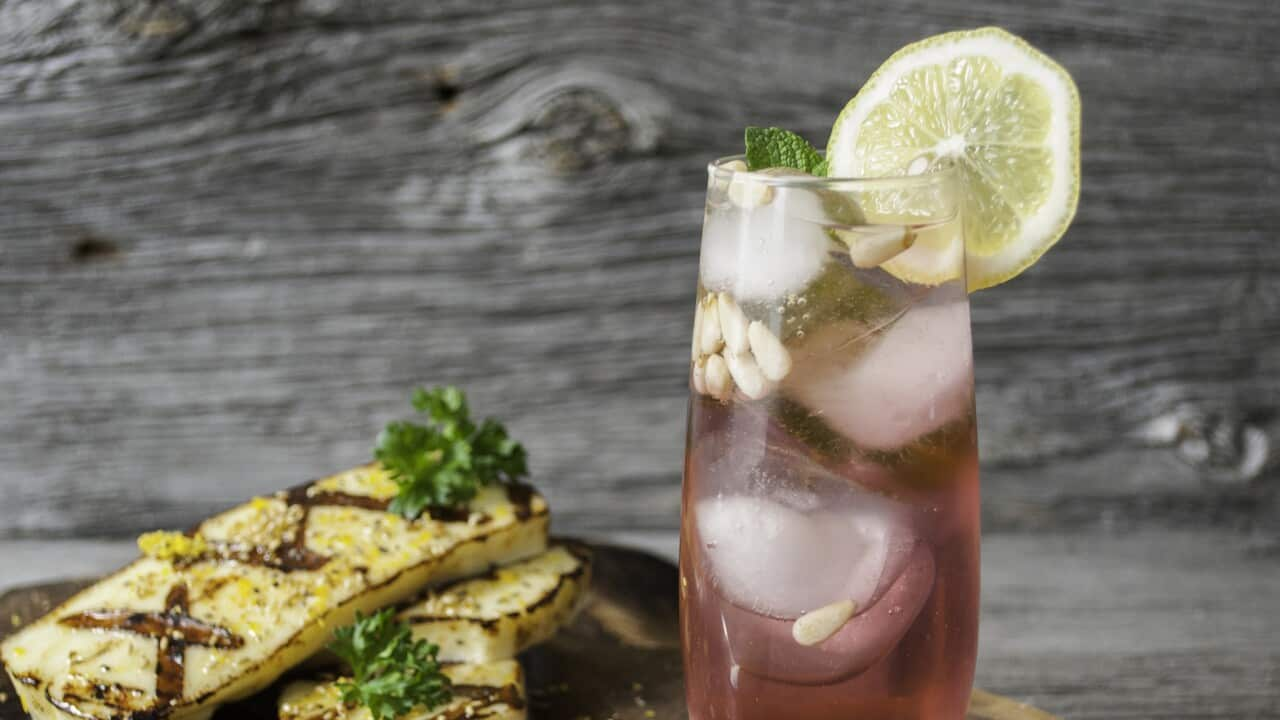For , a home-cooked meal can bring more than just nourishment. It can also represent a source of safety during uncertain times. In the weeks preceding the current pandemic-inspired lockdown, the chef and owner of cafe – a Newtown eatery known for artful, plant-based takes on Middle Eastern staples – was overcome with a powerful urge to feed the members of the community who had lost their livelihoods. So, she worked through a roll call of dishes, coming up with something new every day.
“After a week or so, I thought it was best to close the shop completely but then, I realised that whether they were working in hospitality or freelancers and casuals, people in our community were losing their jobs,” she tells SBS. “I woke up one morning and realised that I should just cook food and tell people to pick it up – and I started receiving text messages from people. One day, I cooked a vegan shepherd’s pie. Other times, it was more traditional – lentil rice and salad, or stew. I was able to keep sane by cooking for those who needed comfort.” Shaweesh was born in Sydney and raised in Jordan, Malaysia and Saudi Arabia, but her roots are Palestinian. As she’s adjusted to working life at home – a routine that involves dreaming up new recipes for the cafe, punctuated with – she’s also started cooking musakhan. The much-loved Palestinian dish is traditionally made by slow-cooking chicken topped with sumac, onions, olive oil and pine nuts over Levantine flatbread. Shaweesh makes this bread herself although it’s traditionally baked with rocks to flatten the dough in a clay oven known as a tabun.
Shaweesh was born in Sydney and raised in Jordan, Malaysia and Saudi Arabia, but her roots are Palestinian. As she’s adjusted to working life at home – a routine that involves dreaming up new recipes for the cafe, punctuated with – she’s also started cooking musakhan. The much-loved Palestinian dish is traditionally made by slow-cooking chicken topped with sumac, onions, olive oil and pine nuts over Levantine flatbread. Shaweesh makes this bread herself although it’s traditionally baked with rocks to flatten the dough in a clay oven known as a tabun.

A colourful range of Middle Eastern vegan dishes at Khamsa in Newtown. Source: Facebook/Khamsa Cafe Newtown
Shaweesh attributes her earliest memories of musakhan, Arabic for “heated up”, to her aunt Hajjar Shaweesh, who used to cook meals for her extended family.
“My dad’s sister would cook for the family Monday to Sunday and she did it out of love,” she says. “My family is very large, so there'd be 50 or 60 people at a time. I grew up eating musakhan on a weekly basis and it was just delicious. You stack it up on a big platter and dip into it with a little bit of bread. You eat it with your hands and at the end, you’d get sumac all over you. Everyone has their own technique for making it – when we’d go to a different aunty’s house, she would have a different method.” Shaweesh is vegan. At Khamsa cafe, she serves dishes such as Baby Don’t Freekeh, covered with baby carrots and pomegranate seeds. is famously made from chicken. As the chicken roasts, the sumac and olive oil turn the meat a deep brown-purple. But the version she cooks for herself at home in Newtown swaps out chicken for mushrooms, an easy fix that turns a meat-centred dish into one that’s plant-based.
Shaweesh is vegan. At Khamsa cafe, she serves dishes such as Baby Don’t Freekeh, covered with baby carrots and pomegranate seeds. is famously made from chicken. As the chicken roasts, the sumac and olive oil turn the meat a deep brown-purple. But the version she cooks for herself at home in Newtown swaps out chicken for mushrooms, an easy fix that turns a meat-centred dish into one that’s plant-based.

Typical versions of this Palestinian dish are made with sumac-flavoured chicken. Source: Ainsley Eats The Streets
“Mushrooms mimic chicken in a weird way,” says Shaweesh.
I grew up eating musakhan on a weekly basis and it was just delicious. You stack it up on a big platter and dip into it with a little bit of bread. You eat it with your hands and at the end, you’d get sumac all over you.
“I’d made it previously with onion and sumac – but then I added mushrooms and it was delicious. You have to use portobello and oyster mushrooms because they give the best texture and flavour.”
Shaweesh uses coconut yoghurt for the dressing.
“Coconut yoghurt is insane, it’s so versatile,” she smiles. “You can add tahini and lemon and bake with it. Before I closed the cafe, I was stuffing triangles with musakhan topping – we were making two batches a day and selling out. You can have musakhan for lunch or for dinner. And the next day, the leftovers are amazing.”

Everyone in her family has a different approach to the dish – this mushroom version is her spin on the Middle Eastern staple. Source: Khamsa
Sarah Shaweesh’s musakhan
Musakhan bread dough
- 7 g dried yeast
- 3 cups plain flour, plus extra for dusting
- ½ tsp pink salt
- ⅓ cup olive oil
- 1 cup warm water (adjust according to texture)
- ¼ cup fresh parsley, minced
- ½ cup pine nuts or slithered almonds, pan-roasted with olive oil
1. Place yeast, flour and salt in a bowl and thoroughly mix ingredients.
2. Pour oil into the bowl, then gradually add water into the mix and gently knead the dough with a silicone spatula as you do.
4. Cover the bowl with a tea towel and let the dough rise for no more than 1 hour.
5. Portion the dough into 4 or 2 sections, according to your preference.
6. Dust flour on a bench and roll out the dough into 1.5cm-thick rounds with a rolling pin.
7. Place the dough in a baking pan (I like to use pizza pans).
8. Place the sumac onion mushroom topping (see recipe below) on the dough and bake in the oven until the bread is golden (approximately 25 mins at 180˚C)
9. Remove from the oven and garnish with parsley and roasted nuts.
10. Serve with Palestinian salad and mint yoghurt (see recipes below).
Sumac onion mushroom topping
- 4 tbsp olive oil
- 5 large onions, diced into 2cm-thick cubes
- 3 cloves garlic, crushed
- 250 g portobello mushrooms, sliced
- 1 punnet oyster mushrooms, shredded
- 1 cardamom pod (the whole pod goes in – traditionally someone will find it on their plate for good luck)
- 2 tsp allspice
- 1 tsp cinnamon
- 1 tsp pink salt
- 5 tbsp sumac
1. Heat a pan over high heat and add olive oil for 1 minute. Add diced onion and garlic and stir until caramelised.
2. Add mushrooms to the pan and cook until they release their juices. Add the cardamom, allspice, cinnamon and salt and cook until the onions are golden. Add sumac and stir through, then take the pan off the heat.
Palestinian salad
Ingredients
- 2 tomatoes, diced
- 2 cucumbers, diced
- ¼ Spanish onion, diced
- ¼ cup fresh parsley, minced
- ½ lemon, juiced
- 2 tbsp olive oil
- ¼ tsp pink salt
1. Add vegetables and herbs to a bowl.
2. In another bowl, mix lemon, salt and olive oil until well combined. Drizzle over vegetables, adjusting dressing to your taste.
Mint yoghurt
- 1 cup coconut yoghurt
- 1 tsp tahini
- ½ lemon, juiced
- ½ tsp pink salt
- 1 garlic clove, crushed
- 2 cucumbers, diced
- 2 tsp dried mint
1. Whisk coconut yoghurt, tahini, lemon, salt and garlic together in a bowl.
2. Add cucumber and dried mint. Mix until well combined.
More Middle Eastern flavours

Palestinian sumac chicken with sautéed onions (msakhan)











